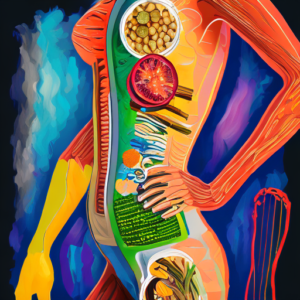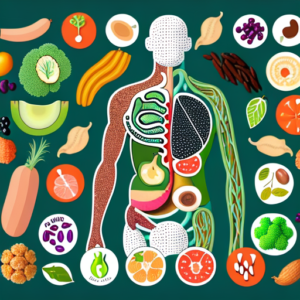Gut Health: Foods And Supplements That Support Gut Health
Your gut is home to trillions of microbes, including bacteria, fungi, and viruses. These microbes are important for many aspects of health, including digestion, nutrient absorption, and immune function. Foods Support Gut Health in a larger way.
Unfortunately, the modern world is not kind to our gut health. Stress, processed foods, antibiotics, and other factors can disrupt the delicate balance of microbes in our gut, leading to digestive problems, nutrient deficiencies, and a host of other health issues.
eating a diet that supports gut health is one of the best things you can do for your overall health. Here are some of the best gut-friendly foods to eat:
1. Fermented foods:
Fermented foods: Fermented foods are a great source of probiotics, which are live bacteria that can help restore the balance of microbes in your gut. Some delicious fermented foods to try include yogurt, kimchi, sauerkraut, and miso.
2. Prebiotic foods:
Prebiotic foods: Prebiotics are foods that contain non-digestible fibers that feed the good bacteria in your gut. Some great prebiotic foods include bananas, onions, garlic, leeks, and asparagus.
3. Bone broth:
Bone broth: Bone broth is rich in nutrients that support gut health, including collagen, amino acids, and minerals. It’s also easy to make at home or find at many health food stores.
4. Green leafy vegetables:
Green leafy vegetables: Green leafy vegetables are packed with vitamins, minerals, and antioxidants that support gut health. Make sure to include plenty of spinach, kale, Swiss chard, and other greens in your diet.
5. Healthy fats:
Healthy fats: Healthy fats are an important part of a gut-friendly diet. They help keep the lining of your gut healthy and help absorb fat-soluble vitamins. Good sources of healthy fats include avocados, olive oil, nuts, and seeds.
6. Water:
Water: Staying hydrated is essential for gut health. Make sure to drink plenty of water throughout the day to keep your digestive system functioning properly.
Supplements for support Gut Health.
There are a lot of different supplements out there that claim to be good for gut health. But which ones are actually backed by science? In this blog post, we’ll take a look at some of the most popular supplements for gut health and see what the research says about them.
One of the most popular supplements for gut health is probiotics. Probiotics are live bacteria that are similar to the ones that live in your gut. They can be found in yogurt, fermented foods, and supplements. Probiotics are thought to help gut health by restoring the balance of good and bad bacteria in the gut, improving digestion, and reducing inflammation.
Study 1
One study found that probiotics improved gut health in people with IBS. Another study found that probiotics reduced inflammation in people with Crohn’s disease. Probiotics are generally considered safe, but they can cause gas and bloating in some people. If you’re thinking about taking probiotics, be sure to talk to your doctor first.
Another popular supplement for gut health is fiber. Fiber is a type of carbohydrate that the body can’t digest. It’s found in foods like fruits, vegetables, and whole grains. Fiber is thought to improve gut health by helping with digestion, reducing inflammation, and keeping the colon healthy.
Study 2
One study found that fiber improved gut health in people with IBS. Another study found that fiber reduced inflammation in people with Crohn’s disease. Fiber is generally considered safe, but it can cause gas and bloating in some people. If you’re thinking about taking fiber supplements, be sure to talk to your doctor first.
Glutamine is an amino acid that’s found in meat, eggs, and dairy products. It’s also available in supplement form. Glutamine is thought to improve gut health by reducing inflammation and helping with wound healing.
Study 3
One study found that glutamine improved gut health in people with IBS. Another study found that glutamine reduced inflammation in people with Crohn’s disease. Glutamine is generally considered safe, but it can cause some side effects like headaches and dizziness. If you’re thinking about taking glutamine supplements, be sure to talk to your doctor first.
Zinc is a mineral that’s found in meat, seafood, nuts, and seeds. It’s also available in supplement form. Zinc is thought to improve gut health by reducing inflammation and helping with wound healing.
Study 4
One study found that zinc improved gut health in people with IBS. Another study found that zinc reduced inflammation in people with Crohn’s disease. Zinc is generally considered safe, but it can cause some side effects like nausea and diarrhea. If you’re thinking about taking zinc supplements, be sure to talk to your doctor first.
Vitamin D is a nutrient that’s found in fatty fish, fortified milk, and supplements. Vitamin D is thought to improve gut health by reducing inflammation.
Study 5
One study found that vitamin D improved gut health in people with IBS. Another study found that vitamin D reduced inflammation in people with Crohn’s disease. Vitamin D is generally considered safe, but it can cause some side effects like fatigue and muscle aches. If you’re thinking about taking vitamin D supplements, be sure to talk to your doctor first.
curcumin is a compound that’s found in turmeric. It’s also available in supplement form. Curcumin is thought to improve gut health by reducing inflammation.
Study 6
One study found that curcumin improved gut health in people with IBS. Another study found that curcumin reduced inflammation in people with Crohn’s disease. Curcumin is generally considered safe, but it can cause some side effects like diarrhea and indigestion. If you’re thinking about taking curcumin supplements, be sure to talk to your doctor first.
Omega-3 fatty acids are found in fish, nuts, and seeds. They’re also available in supplement form. Omega-3 fatty acids are thought to improve gut health by reducing inflammation.
Study 7
One study found that omega-3 fatty acids improved gut health in people with IBS. Another study found that omega-3 fatty acids reduced inflammation in people with Crohn’s disease. Omega-3 fatty acids are generally considered safe, but they can cause some side effects like gastrointestinal upset and fishy breath. If you’re thinking about taking omega-3 supplements, be sure to talk to your doctor first.
In conclusion, there are a number of different supplements that have been shown to improve gut health. Probiotics, fiber, glutamine, zinc, vitamin D, curcumin, and omega-3 fatty acids are all backed by science. If you’re thinking about taking any of these supplements, be sure to talk to your doctor first.
Prebiotics and Probiotics for Gut Health
Prebiotics and probiotics are two important types of food for gut health. Probiotics are live microorganisms that benefit the body, while prebiotics are non-digestible carbohydrates that serve as food for probiotics.
Consuming both prebiotics and probiotics can help to maintain a healthy balance of gut bacteria, which is important for gut health. Probiotics help to keep the gut bacteria healthy, while prebiotics help to feed them.
There are many different types of probiotics, which are found in different foods. Some common examples include yogurt, sauerkraut, kimchi, and kombucha. Probiotics can also be taken as supplements.
Prebiotics are found in a variety of foods as well, including bananas, garlic, onions, leeks, asparagus, oats, and wheat. Like probiotics, they can also be taken as supplements.
Consuming a diet rich in prebiotics and probiotics can help to improve gut health. Some studies have shown that they can help to relieve symptoms of irritable bowel syndrome (IBS), inflammatory bowel disease (IBD), and other digestive disorders. They may also help to boost the immune system and reduce the risk of certain infections.
If you’re looking to improve your gut health, adding prebiotics and probiotics to your diet is a good place to start. Foods Support Gut Health is a big topic to discuss further.





